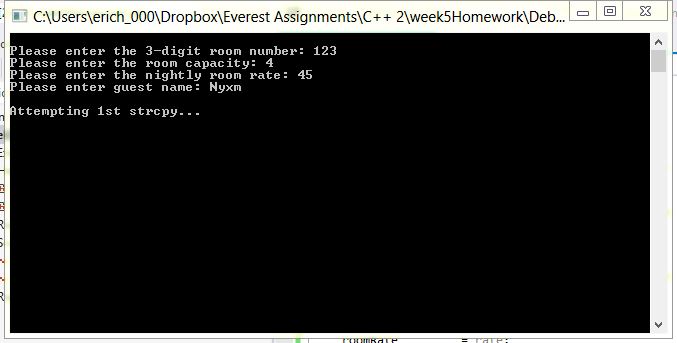<分区>
我提供的代码是第三周学习这门课的结果。我对事情有很好的处理能力,(或者我认为),但本周的重点是指针,我不知道为什么我总是收到这个错误。我不断收到调试断言失败!错误以及一般的“缓冲区太小”解释。

这是我使用 VS 2012 RC 版本 11.0.505221.1 在 Win8 操作系统上编译的完整代码。与我在 Linux 中编译的唯一区别是我在此代码中使用了 strcpy_s(),因为出于某种原因 MS 不喜欢 strcpy()。
#include "stdafx.h"
#include <iostream>
#include <string>
#include <iomanip>
#include <limits>
using namespace std;
class HotelRoom
{
char roomNumber[4];
char guest[81];
int roomCapacity, currentOccupants;
double roomRate;
public:
HotelRoom(char[], char[], int, double);
~HotelRoom();
void DisplayRoom();
void DisplayNumber();
void DisplayName();
int GetCapacity();
int GetStatus();
double GetRate();
void ChangeStatus(int);
void ChangeRate(double);
};
HotelRoom::~HotelRoom() {
cout << endl << endl;
cout << "Room #" << roomNumber << " no longer exists." << endl;
delete [] guest;
}
void HotelRoom::DisplayName() {
cout << guest;
}
void HotelRoom::DisplayNumber() {
cout << roomNumber;
}
int HotelRoom::GetCapacity() {
return roomCapacity;
}
int HotelRoom::GetStatus() {
return currentOccupants;
}
double HotelRoom::GetRate() {
return roomRate;
}
void HotelRoom::ChangeStatus(int occupants) {
if(occupants <= roomCapacity) {
currentOccupants = occupants;
}
else {
cout << endl << "There are too many people for this room. Setting occupancy to -1." << endl;
currentOccupants = -1;
}
}
void HotelRoom::ChangeRate(double rate) {
roomRate = rate;
}
HotelRoom::HotelRoom(char room[], char guestName[], int capacity, double rate)
{
strcpy_s(roomNumber, room); //Compiles fine with strcpy on Linux, but MS is making me use strcpy_s to compile
guestName = new char[strlen(guestName) + 1];
strcpy_s(guest, guestName); //Same as above
roomCapacity = capacity;
currentOccupants = 0;
roomRate = rate;
}
void HotelRoom::DisplayRoom()
{
cout << setprecision(2)
<< setiosflags(ios::fixed)
<< setiosflags(ios::showpoint);
cout << endl << "The following is pertinent data relating to the room:\n"
<< "Guest Name: " << guest << endl
<< "Room Number: " << roomNumber << endl
<< "Room Capacity: " << GetCapacity() << endl
<< "Current Occupants: " << GetStatus() << endl
<< "Room Rate: $" << GetRate() << endl;
}
int main()
{
int numOfGuests;
char roomNum[4];
char buffer[81]; //Buffer to store guest's name
int roomCap;
double roomRt;
bool badInput = true;
cout << endl << "Please enter the 3-digit room number: ";
do { //loop to check user input
badInput = false;
for(int x = 0; x < 3; x++)
{
cin >> roomNum[x];
if(!isdigit(roomNum[x])) //check all chars entered are digits
{
badInput = true;
}
}
char x = cin.get();
if(x != '\n') //check that only 3 chars were entered
{
badInput = true;
}
if(badInput)
{
cout << endl << "You did not enter a valid room number. Please try again: ";
}
} while(badInput);
for(;;) //Infinite loop broken when correct input obtained
{
cout << "Please enter the room capacity: ";
if(cin >> roomCap) {
break;
} else {
cout << "Please enter a valid integer" << endl;
cin.clear();
cin.ignore(numeric_limits<streamsize>::max(), '\n');
}
}
for(;;) //Infinite loop broken when correct input obtained
{
cout << "Please enter the nightly room rate: ";
if(cin >> roomRt) {
break;
} else {
cout << "Please enter a valid rate" << endl;
cin.clear();
cin.ignore(numeric_limits<streamsize>::max(), '\n');
}
}
cin.get(); //Dump the trailing return character
cout << "Please enter guest name: ";
cin.getline(buffer, 81);
HotelRoom room1(roomNum, buffer, roomCap, roomRt);
for (;;) { //Infinite loop broken when correct input obtained
cout << "Please enter the number of guests for room #";
room1.DisplayNumber();
cout << ": ";
if (cin >> numOfGuests) {
break;
} else {
cout << "Please enter a valid integer" << endl;
cin.clear();
cin.ignore(numeric_limits<streamsize>::max(), '\n');
}
}
room1.ChangeStatus(numOfGuests);
room1.DisplayRoom();
cout << endl << "The following shows after the guests have checked out." << endl;
room1.ChangeStatus(0);
room1.DisplayRoom();
room1.ChangeRate(175.0);
for (;;) { //Infinite loop broken when correct input obtained
cout << "Please enter the number of guests for room #";
room1.DisplayNumber();
cout << ": ";
if (cin >> numOfGuests) {
break;
} else {
cout << "Please enter a valid integer" << endl;
cin.clear();
cin.ignore(numeric_limits<streamsize>::max(), '\n');
}
}
room1.ChangeStatus(numOfGuests);
room1.DisplayRoom();
return 0;
}
更新:
我已经添加了cout 语句来查看程序中出现问题的位置,并且它肯定是在HotelRoom 构造函数中的strcpy() 语句处。这是构造函数,下面是我收到的输出
HotelRoom::HotelRoom(char room[], char guestName[], int capacity, double rate)
{
cout << endl << "Attempting 1st strcpy...";
strcpy_s(roomNumber, room); //Compiles fine with strcpy on Linux, but MS is making me use strcpy_s to compile
cout << endl << "1st strcpy successful!";
guestName = new char[strlen(guestName) + 1];
cout << endl << "Attempting 2nd strcpy...";
strcpy_s(guest, guestName); //Same as above
cout << endl << "2nd strcpy successful!";
roomCapacity = capacity;
currentOccupants = 0;
roomRate = rate;
}
